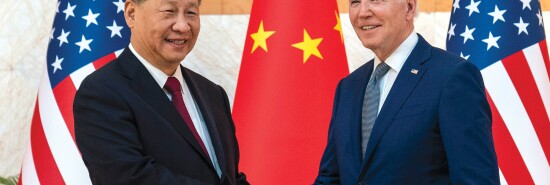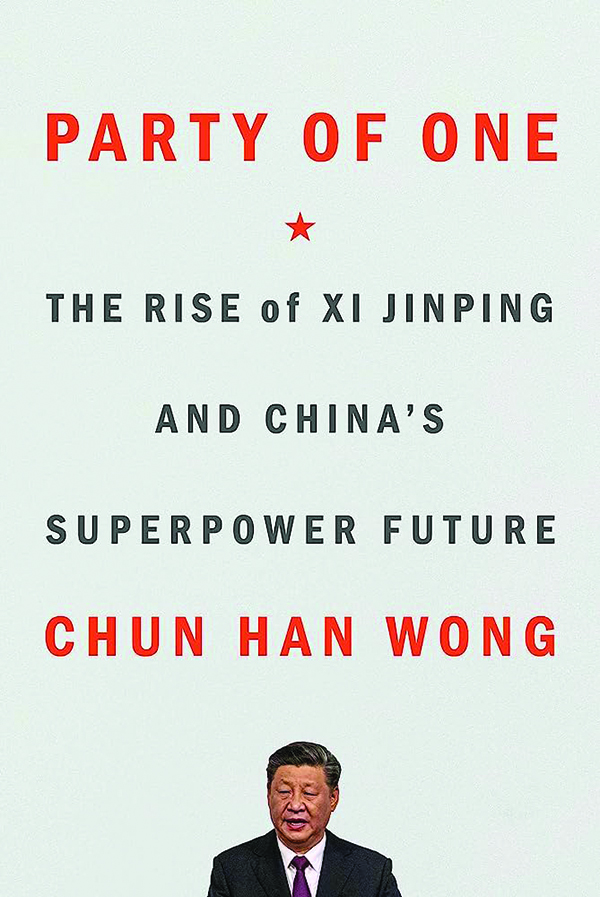
The bitter birth of dictator Xi Jinping
Sean Durns
Xi Jinping is the most powerful person in the world. China’s leader rules over a nation of 1.4 billion, a country with a global reach whose only peer is the United States. And unlike President Joe Biden, Xi does not have to answer to a Supreme Court or an independent legislature. Yet, for all his importance, little is known about Xi. In his new book, Party of One: Xi Jinping and China’s Superpower Future, Wall Street Journal reporter Chun Han Wong seeks to remedy this problem.

Xi, Chun Han Wong details, is part and parcel of the Chinese Communist Party that he leads. His legitimacy is inseparable from the party that he controls, a feature that distinguishes him from some of his more powerful predecessors who could point to their track records as creators of the Chinese communist state. But to understand the son, one must first understand the father.
The son of a famous revolutionary named Xi Zhongxun, Xi Jinping is part of a generation known as the “princelings” — the sons and daughters of the founders of the People’s Republic of China. The elder Xi fought as a revolutionary alongside Mao Zedong, Zhou Enlai, Deng Xiaoping, and others who battled the Japanese, the Chinese nationalist forces of Chiang Kai-shek, and the West in their bid to bring communism to the world’s most populous nation. Xi Zhongxun, however, would find himself a victim of Mao’s internal purges in the mid-1960s. His family would experience both the highs and lows of the state that he helped forge.
Xi was born in Beijing in 1953, a year after Mao summoned his father to be the propaganda minister for the CCP. Although he was born to privilege — in 1956, top CCP apparatchiks earned 36 times the wages earned by lower-level officials — the elder Xi “was a strict and frugal parent.” Xi Zhongxun regaled his children with stories of his revolutionary exploits while making them reuse bathwater and take a bus to commute.
In 1962, Xi Zhongxun was purged from power, and his children’s station in life declined precipitously. Beginning in 1965, he wouldn’t see his family for seven years. In 1966, Mao launched the Cultural Revolution, calling on the young to attack the “Four Olds”: old culture, old habits, old customs, and old ideas. The move was a power play by Mao, an attempt to eliminate rivals and critics who, he feared, were emboldened by his disastrous Great Leap Forward, a failed plan to industrialize China that resulted in 45 million dead. The Cultural Revolution resulted in more chaos and death, further weakening the Middle Kingdom.
During the chaos of the Cultural Revolution, Xi “escaped physical injury but not psychological trauma,” his biographer notes. One can only speculate on how that trauma has affected China’s current leader, but it would defy credulity to think that it hasn’t played a key role in shaping him. As Chun Hang Wong notes: “Xi Zhongxun, already a pariah, suffered further persecution, getting abused in struggle sessions and thrown into detention.” Mao’s Red Guards “ransacked his home, and his wife and children were forced out of Beijing.” Official accounts even state that his half-sister, Heping, “was ‘persecuted to death,’ which some historians and party insiders say meant that she was hounded into killing herself.”
Many of Xi Jinping’s contemporaries formed their own Red Guard units, but Xi was too tainted by his father’s fall from grace to join them. Instead, Chun notes, “peers pilloried and publicly shamed him.” The younger Xi was literally chased by his fellow schoolchildren and bullied by teachers.
His own mother, Qi Xin, was forced to take part in some of these demonstrations, publicly denouncing her own son. One rainy night, Xi Jinping “slipped out of detention … and ran home cold and hungry, hoping his mother would make him some food.” Yet worried about feeding her other younger children and not wanting to be in trouble for sheltering a “counterrevolutionary,” Qi Xin reported him instead.
At age 15, Xi Jinping would journey from Beijing to the Chinese countryside in Shaanxi. Xi would be one of 15 youths who were assigned to Liangjiahe, a cluster of more than 60 households living in cave dwellings. There, Xi woke at 6 a.m. for farm work. He would take up smoking to get breaks and would flee after three months, only to return after being admonished by a maternal aunt, Qi Yun, and her husband. Xi’s time in the countryside purportedly left him with “an ability to relate to ordinary people and a desire to reclaim his family’s status.” It has since become part of communist party lore, and the village itself is now a popular “red tourism” destination.
In an interview with a CCP-run magazine in 2000, Xi Jinping seemed to reflect on these bitter experiences. “People who have little contact with power, who are far from it, always see these things as mysterious and novel. But what I see is not just the superficial things: the power, the flowers, the glory, the applause. I see the cowsheds” — makeshift detention houses — “and how people can blow hot and cold. I understand politics at a deeper level.”
Mao would die in 1976, and, after a brief interregnum, Deng Xiaoping would take power as the new ruler of China. Deng himself had been a victim of Mao’s purges and had seen his fortunes wax and wane at the Great Helmsman’s whim. The new leader would rehabilitate several of his compatriots, including Xi Zhongxun. And while he had once unjustly suffered on account of his father, Xi Jinping would now benefit from his familial ties. He would turn to the same party that had persecuted him and his family.
It took Xi Jinping 10 tries before he was successfully admitted by the CCP. The younger Xi’s “embrace of the party,” Chun Han Wong noted, “baffled some of his friends” who had also been persecuted for their parents’ crimes, real or imagined. But there was a method to the madness. As one of them, Yi Xiaoxiong, observed, Xi had chosen “to survive by becoming redder than the red.”
After time in the military rising through family connections, Xi made a seemingly surprising decision, opting to return to the countryside after three years. “Xi,” Chun Han Wong observes, “had every chance of rising to the PLA’s senior ranks, as some of his princeling peers would do. But his mind was set.” In a conversation with Yi, Xi reportedly said that “going out into the provinces was his ‘only path to central power.’” By heading out into the provinces, Xi was able to build his own power base slowly.
Xi spent years working as a local administrator in provinces far from Beijing, gaining mentors and accumulating favors. He married a famous singer named Peng Liyuan, who became Xi’s second wife and the mother of his daughter. For years, Xi kept such a low profile that a popular joke was “Who is Xi Jinping? He’s Peng Liyuan’s husband.”
As an administrator, Xi was known for his caution, preferring to work “by the book and avoiding decisions that could backfire later.” There is a historical comparison that is perhaps apt. Trotsky famously described Stalin as a “grey blur” — a colorless bureaucrat. Yet, Stalin had mastered the party machinery and eventually overpowered Trotsky. Similarly, Xi masked his rise, appearing unthreatening to potential rivals while simultaneously accruing the power to unseat them eventually.
In late 2007, Xi was appointed to the Politburo Standing Committee and was named first secretary of the CCP’s General Secretariat, both of which were signs that he would likely succeed the then-head of the party, Hu Jintao. In 2012, he did just that, being named general secretary of the CCP, president of the PRC, and, perhaps most important, chairman of the Central Military Committee.
In the decade since, Xi has rapidly centralized power. In 2022, Xi broke the precedent of a Chinese premier only serving two terms. Xi has also made “Xi Jinping thought” central to CCP ideology, working to establish the type of personality cult launched by Mao and discarded in the years after his bloody rule.
Yet, the China of today isn’t Mao’s China. It is far more powerful, more consequential. And as Chun Han Wong details in his thoughtful and well-written biography, its future will hinge on the man now at its helm.
CLICK HERE TO READ MORE FROM THE WASHINGTON EXAMINER
Sean Durns is a Washington D.C.-based foreign affairs analyst.
